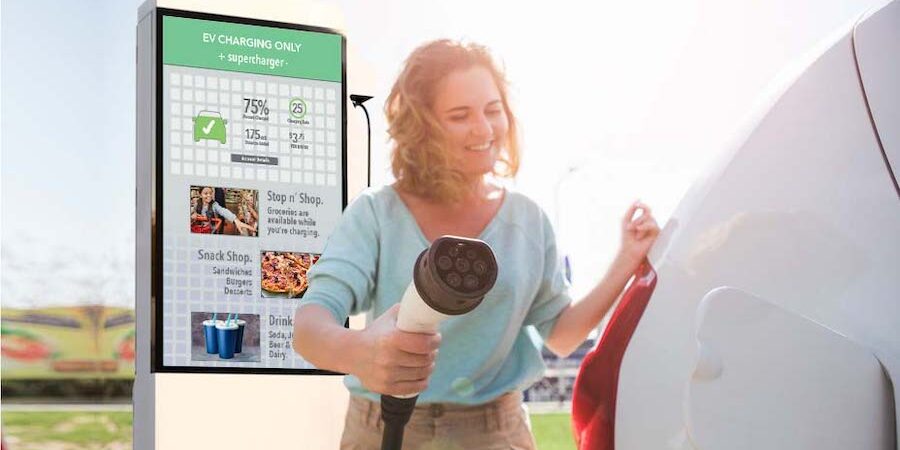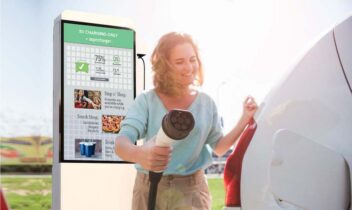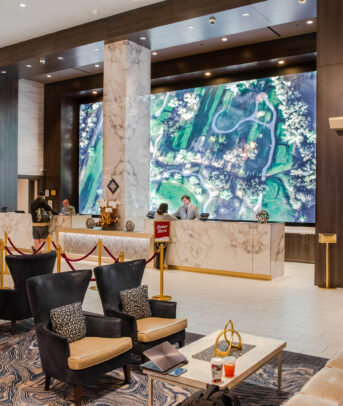According to a study by the National Renewable Energy Laboratory, between 30 and 42 million light-duty electric vehicles (EVs) will be on U.S. roads by 2030. To support this shift, the country will need a comprehensive network of EV charging infrastructure, both at private residences and in public spaces, such as parks, restaurants, convenience stores and parking areas.
Hotels can play an important role in this energy transformation — and they will — as EV charging for hotels is now a sought-after amenity in the hospitality industry. In fact, a 2023 survey by J.D. Power revealed that nearly 1 in 5 hotel guests want an EV charging station at their hotel, and that number is expected to keep rising as EV car sales do. The feature is also a differentiator that appeals to a specific market segment, making the hotel more attractive to eco-conscious travelers and showcasing a commitment to sustainability and cutting-edge technology.
What is EV charging?
EVs rely on rechargeable batteries to store electricity and power the electric motor that propels the vehicle. That means EVs need a charging station to keep operating. Several types of EV charging stations are available — which one a driver uses might depend on where they live, how fast they need a charge and how much they want to pay for it.
- Level 1 charging stations: These provide the slowest form of charging and typically involve plugging the EV into a standard 120-volt household outlet. This method is the most cost-effective and convenient for overnight charging at home, but it takes a long time to fully charge the vehicle.
- Level 2 charging stations: These stations use 240-volt power and are therefore faster than Level 1, fully charging an EV in a few hours, depending on the battery capacity. They are common in residential settings such as apartment complexes, condominiums, workplaces and public parking lots.
- Direct current fast charging stations: These provide the quickest charge in the least amount of time — typically around 30 minutes for an 80% charge. These are often located along highways and at restaurants and travel centers, where EV drivers might spend a relatively short amount of time and then be on their way.
EV-charging hotels bring new revenue
Beyond providing a valuable service to drivers, EV charging stations offer other benefits to hotel operators. First, it attracts guests seeking charging infrastructure, which increases overall profits and helps pay for charging infrastructure. Hotels may also charge guests a certain rate for charging, adding yet another income stream.
In addition to being power sources, EV charging stations function as dynamic information hubs. Like miniature billboards, they can display various content, including real-time traffic and weather updates, promotional messages, restaurant menus, community announcements and more.
Samsung EV charging kiosks paired with a robust content management system and Samsung Ads open up a monetization model beyond the revenue hotels can receive from charging guests’ cars. EV charging isn’t just for travelers staying at the hotel; it can also draw in local drivers who need to charge up, fostering consumer loyalty and ongoing revenue. For example, hotels might show photos of their rooms, spa, restaurant and other amenities to increase awareness of the property’s offerings.
Why is EV charging for hospitality brands beneficial?
Electric cars sold in the U.S. can drive between 100–300 miles on one charge — and while more vehicles are nearing the top of that range, EV drivers must plan road trips a bit more strategically than those driving traditional internal-combustion vehicles. This means hotels with charging stations are more attractive to those driving EVs.
Digital transformation and the guest experience
Learn how a single, unified digital solution can elevate and personalize your guest experience. Download Now
EV charging stations allow guests to charge their vehicles while they stay, eliminating the need to search for external charging stations or leave the hotel premises. Instead, they can charge their cars overnight, ensuring a full battery the next morning. In the meantime, they can enjoy on-site restaurants and amenities or patronize nearby businesses.
EV charging for hotels also attracts eco-conscious travelers. Offering EV charging stations demonstrates a commitment to sustainability and sends a clear message that the hotel is taking steps to reduce its carbon footprint and support cleaner transportation options.
How to implement EV charging stations at your hotel
Hotel operators must assess their specific objectives in order to create a tailored EV charging solution that benefits the business, its guests and the environment. Thanks to its technology and industry expertise, partners like Samsung can provide critical support in helping hotel operators implement effective EV charging solutions.
They can also ensure the charging infrastructure is set up correctly and provide ongoing support to address any technical and maintenance issues that may arise. Additionally, charging usage, user patterns and other relevant data can be tracked for business insights and marketing efforts.
Finally, a technology partner like Samsung can help hotel operators navigate the regulatory landscape for EV charging, ensuring they meet safety and accessibility standards. Samsung can also advise hotel operators on future-proofing their EV charging infrastructure, taking into account the latest advancements in EV technology and charging standards.
Embrace the electric revolution
By investing in chagrin infrastructure, hotels can position themselves to cater to the needs of EV owners and travelers. With Samsung as a dedicated technology partner, hotel operators can meet the growing demand for EV charging services, enhance their sustainability initiatives and earn the loyalty of eco-conscious guests.
Learn more about how digital transformation is elevating the guest experience in a number of ways, as well as how hotels can leverage sustainable technology to save energy and costs while burnishing the brand.








